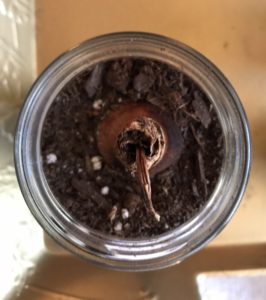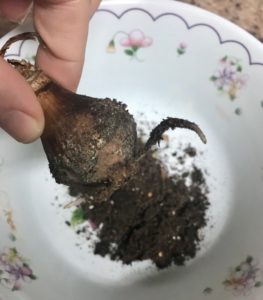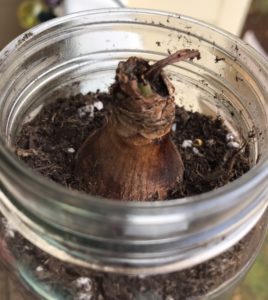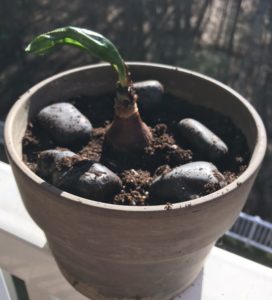Back in the October, I bought some amaryllis bulbs. I’ve done this several times in past Fall seasons as an attempt to eek through cold and dreary winters with a small sign of life to cheer me up. The ones I purchased came in a package of three, and the names of two other women quickly came to mind. These women were going through their own harsh winters, different than mine but cold and biting in their own ways. I heard God whisper that he would use these bulbs to teach us secrets to finding life, even in the dead of winter.
Three dried, brown bulbs, all looking lifeless, but one of the three looking especially dead, dead, dead. I kept that one for myself, not wanting to risk the chance of giving the “encouraging” gift of death to someone else. But soon I felt the weight of that decision: Two short weeks. Two chirpy texts. Two growing buds. Two friends with hope in bloom. Yet there sat my bulb: dead, dead, dead.
It’s interesting how Hope Manifest juxtaposed next to Hope-In-Waiting exposes the truth of the heart. Romans 12:15 entreats us to rejoice with those who rejoice and mourn with those who mourn, but sometimes it can be difficult to rejoice when you are all by your lonesome, stuck in the waiting. The lie is that there isn’t enough of God’s goodness to go around; that somehow their gain is your loss. And it can be easy to mediate on possible reasons why it seems you weren’t the one chosen for a miracle. But those shame-filled thoughts go nowhere good. I quickly confessed to the ladies my rotten feelings and the condition of the hope in my heart: dead, dead, dead.
But we are prisoners of hope. So, before leaving for a long trip, I watered my bulb carefully and believed things would look differently by the time I got back. If a watched pot never boils; perhaps a watched bulb never blooms. But on return home, there it was, looking more shriveled and lifeless than ever.
I tried to figure it out. I wondered if mine perhaps had been dead on arrival. Or maybe I had over-watered in my eagerness and it was suffering from mildew. By now, one friend had an actual LEAF  on hers and the other one had at least budded! Mine must be defective, I reasoned. I couldn’t take it any longer. I must know. I tipped over the pot and poured the contents out, including the bulb. I was surprised to see something – a root! It wasn’t a leaf, and it wasn’t very long, but it was something. I repotted the bulb and stuck it back in the window sill. Then, I remembered something I had read when researching amaryllis care. It said amaryllis bulbs are sensitive and don’t like to be repotted. Seeing that tiny root on the bulb had definitely rekindled my hope, but perhaps more blessed is the bulb whose owner didn’t see, yet still believed.
on hers and the other one had at least budded! Mine must be defective, I reasoned. I couldn’t take it any longer. I must know. I tipped over the pot and poured the contents out, including the bulb. I was surprised to see something – a root! It wasn’t a leaf, and it wasn’t very long, but it was something. I repotted the bulb and stuck it back in the window sill. Then, I remembered something I had read when researching amaryllis care. It said amaryllis bulbs are sensitive and don’t like to be repotted. Seeing that tiny root on the bulb had definitely rekindled my hope, but perhaps more blessed is the bulb whose owner didn’t see, yet still believed.
A lack of patience convinced me to upend the bulb to check, and now I wondered what would happen to it. Did my impulsivity pull the life right out of it? Was all hope gone? I take a small comfort in the fact that I am not alone; the frustration of waiting has been a historic temptation for all us humans to take matters into our own hands.
I think back to Abraham, who received a promise to be a father of many, but that promise was given to a couple whose wombs were dead, dead, dead. Romans 4:18 says that against all hope, Abraham in hope, believed and this faith was credited to him as righteousness. Yet, while Abraham believed that He who promised was faithful, Abraham didn’t believe that God would make him wait so long! In the waiting, Abraham had convinced himself that something must be wrong and that he needed to help God make the promise happen. And so he did. But man’s solution to God’s promise didn’t bring forth good fruit. And usually, the same is true for us.
Time went by and I had honestly forgotten about the bulb on my window sill until one day it  flashed through my mind. As I hesitantly peered into the top of the bulb, I saw what looked like the tiniest fleck of green. I carried it to a location with better light. Was it just my imagination? Or was that really growth? It took another few weeks (!) of waiting until the bud was large enough to know for sure it really was a bud. Oh, how my heart exploded when I saw that tiny speck of life.
flashed through my mind. As I hesitantly peered into the top of the bulb, I saw what looked like the tiniest fleck of green. I carried it to a location with better light. Was it just my imagination? Or was that really growth? It took another few weeks (!) of waiting until the bud was large enough to know for sure it really was a bud. Oh, how my heart exploded when I saw that tiny speck of life.
Recently, I was prayed over by a prayer team stranger at a retreat I attended. They said: “Your name is like the month of spring. Spring is a time of life and fruitfulness and you are destined to live in the season of your name. But you have lived in what seems like a perpetual winter. Then a time came that finally seemed like spring, but it was followed by the very darkest winter. Everywhere you looked seemed dead, dead, dead. But do you know what happens in the winter? The winter is where roots grow. The deep in you cries out for the deep of God, but you need stronger roots to go there. You need deep roots to be able to hold the fruit of the coming spring. It is through the winter that He is answering your prayers.”
Oh, this prophetic word of my name being spring has chased me down for over a decade, always in the context of holding on just a little longer in the midst of unchanging circumstances. But could it be true what he said? Could the dead, dead, dead of winter be the surprising answer to the hope of spring?
I often daydream of living in California, soaking in the beautiful sunshine and amazing temperatures. Friends who grew up there have told me as strange as it may sound, endless perfect weather is boring and there is something to be said for experiencing all four seasons. I have always thought them crazy. But Solomon writes in Ecclesiastes 3:1-2, To everything there is a season. A time for every purpose under heaven; A time to be born, and a time to die; A time to plant, and a time to pluck what is planted…
What if the dead, dead, dead of winter waiting is not just an unfortunate part of life to grit your teeth and get through, but actually NECESSARY for a true spring?
I unearth and reread my amaryllis instructions: “The best route to success with spring flower bulbs is to plant them at the optimum times. Ideally, bulbs should be planted in the fall at least six weeks before hard, ground-freezing frost can be expected in your area. The bulbs need time to root and establish themselves.”
I smile as I remember Paul’s prayer in Ephesians 3 that we, being rooted and established in love, may have power, together with all the Lord’s holy people, to grasp how wide and long and high and deep is the love of Christ. Root and establish us. I guess maybe that is what this time does…if we let it. But oh, the loneliness, frustration and desperation of winter waiting can be an unbearable place and often we try to escape its grasp. If we can’t gain a sense of control by making things happen ourselves, perhaps we cover up the ache with noise, busyness, sleep, addictions. But the gentle wooing bids us to settle into the seemingly inactive, solitary stillness of winter, trusting that even in our hibernation, God is somehow working below ground to root and establish us into the source of Love and Life.
The instructions continue: “The temperature should be just perfect for tucking bulbs in for their winter’s rest.”
Winter…rest? Ha! Winter feels more like death than a relaxing nap. In John 12:24, Jesus says “Truly, truly, I tell you, unless a kernel of wheat falls to the ground and dies, it remains only a seed; but if it dies, it bears much fruit.” There is a crossroads of decision here as well: in the face of loss, and in light of the understanding that I can’t (won’t?) control it, do I throw up my hands in angry resignation? – “Fine God, have it your way!” Or do I let go in true surrender? And what does surrender even look like? Here’s a hint: Dead, dead, dead. Surrender is the turning inside out of my own heart, placing it at the feet of the One who I let choose. And then doing this over and over again until it becomes a natural response. It’s releasing my clenched fists as a reminder that I choose to grasp nothing. I feel the grief of my empty hands, but also a strange quietness in the simplicity of letting go.
Today, my bulb still sits on my window sill. The bud eventually grew into a leaf but the leaf has  been the same size for over a month. There is no more evidence of growth, at least not visible to me. I keep it close to the sun. I water it when the soil gets dry. But other than that, I haven’t touched it. I feel no desire to check the bulb again. Maybe I’ve learned my lesson. Or maybe I am learning to trust that it will bring forth it’s fruit in its season (Psalm 1:3). Perhaps a little of both. That doesn’t mean the news of a friend’s stalk growing eight inches tall during the same amount of time doesn’t make me wonder, or even cause an initial tug at my heart. But as I push in, I also experience a sense of hope that the same God who is working a miracle in their pot is working a miracle in mine, even if the evidence is just a few inches under the surface.
been the same size for over a month. There is no more evidence of growth, at least not visible to me. I keep it close to the sun. I water it when the soil gets dry. But other than that, I haven’t touched it. I feel no desire to check the bulb again. Maybe I’ve learned my lesson. Or maybe I am learning to trust that it will bring forth it’s fruit in its season (Psalm 1:3). Perhaps a little of both. That doesn’t mean the news of a friend’s stalk growing eight inches tall during the same amount of time doesn’t make me wonder, or even cause an initial tug at my heart. But as I push in, I also experience a sense of hope that the same God who is working a miracle in their pot is working a miracle in mine, even if the evidence is just a few inches under the surface.
I long for the day talked about in Song of Solomon 2: For lo, the winter is past, the rain is over and gone. The flowers appear on the earth; the time of singing has come. The new Passion translation says it even more poetically: The season has changed, the bondage of your barren winter has ended, and the season of hiding is over and gone. The rains have soaked the earth and left it bright with blossoming flowers. The season for singing and pruning the vines has arrived. I heard the cooing of doves in our land, filling the air with songs to awaken you and guide you forth. Can you not discern this new day of destiny breaking forth around you? Yes, this new day of destiny breaking forth is still the promise I cling to, but I guess I am in a little less of a rush to get there. Instead I burrow in, trying to view all that comes as opportunity to push deeper still into the soil. Deep calls to deep.
As I finish writing this, I know that according to the calendar, today is the first day of spring. I also know that snow is coming tonight. Sometimes things don’t look like you expected.
The instructions end with: “If you miss planting at the opportune time, don’t wait for next fall. Flower bulbs are survivors by nature’s design. Every year, stories abound of bulbs that bloom after being planted under the most improbable circumstances.”
A reminder that even if we miss the most opportune timing and conditions, His mercies are new every morning and there is still hope for spring. The truth was that even though Abraham didn’t wait well, he still became the father of nations. The truth was that even though I uprooted the bulb, there is still somehow life within. The truth is after the dead, dead, dead of winter, spring is sure to follow. To everything, there is a season and a time to every purpose under heaven.
*This was written for my friend Christian’s awesome website #shelaughs. Check it out!